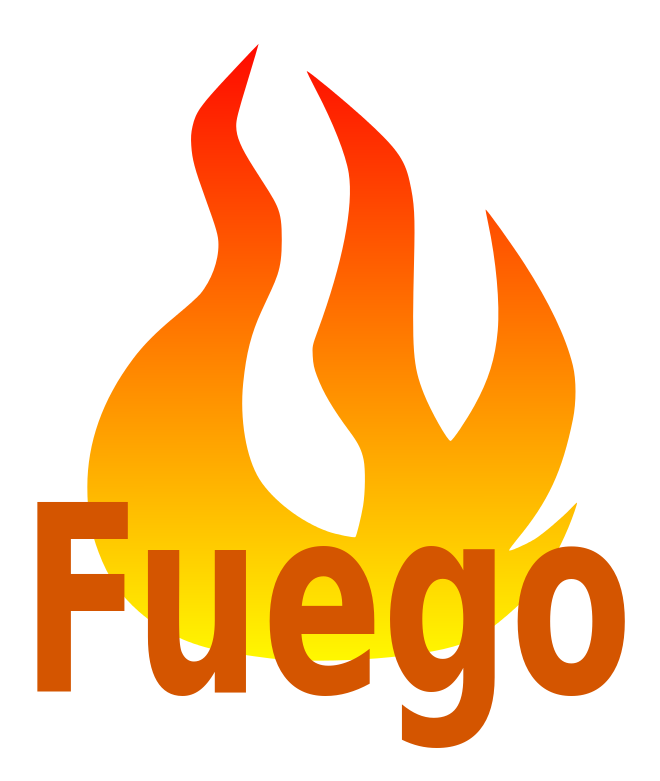HACKxFDU 2017 planning
Resources [edit section]
- Fuego logo:
- png:

- svg: file:fuego-logo.svg
- png:
- official title: "Fuego Test System"
- HACKxFDU web site: https://fdu.hackx.org/index_en.html
- Bao will bring:
- a laptop running Linux, to be the Fuego host
- a wireless router
- 2 Fujitsu dev boards: DB410c boards
Contacts [edit section]
Attending on behalf of the Fuego project is:- Liu Wenlong - Fujitsu <liuwl.fnst (at) cn.fujitsu.com>
- Bao Fei - Fujitsu <baof.fnst (at) cn.fujitsu.com>
Our contact with HACKxFDU:
- Bingkun Zhao - <zhaobingkun (at) gmail.com>
Our projects for the hackfest [edit section]
- first - get the hardware set up, and the students familiar with executing a test manually
- execute Functional.Hello_World on the DB410c
- learn how to write a simple Functional test
- Write a test to check that file systems are mounted correctly
- create test in fuego-core/engine/tests
- write a script for the target board
- emit TAP13 as script output
- write fuego_test.sh with deploy, run, processing functions
- write a script for the target board
- create job for test using ftc
- execute test in Jenkins interface
- examine run.json in Jenkins interface
- create test in fuego-core/engine/tests
- Write a test to check that the system has correct kernel modules loaded
- write a test to check that interrupts are firing at an expected rate
- See Functional.cmt, but generalize it for other platforms
- Write a test to check that file systems are mounted correctly
- learn how to write a simple Benchmark test
- Write a test to perform 'dd' on the target
- write the parser.py for the test
- Copy from Benchmark.Dhrystone/parser.py
- write the parser.py for the test
- Write a test to perform 'dd' on the target
- write a test for a real use case:
- See New test ideas
- year 2038 test
- needs definition of what to test
- xfstests
- stressng
- add specs for sub-tests and stress profiles of interest
- openvas
- feature improvements
- ability to create and use a board-specific criteria.json file
- add dependency checking to an existing test
- add NEED_xxx to a test, to prevent it from running in inappropriate configurations
meta-testing [edit section]
- report bugs or annoyances found while using Fuego 1.2
meta-learning [edit section]
- subscribe to the Fuego mailing list
- use the mailing list to report a bug or ask for input on test design
- use git to create a patch
- send a patch to the mailing list
- use bitbucket to send a pull request
Report [edit section]
Liu Wenlong and Fei Bao prepared the following report about the hackfest:Specific feedback:
- Fuego wiki is very useful, but it's not humanized enough for new users. Sometimes, itís hard to find a link that has just been closed if you not familiar with the Fuego wiki structure.
- Students helped find a bug related to "PER_JOB_BUILD", but were too shy to send mail.
- Wiki page is not very suitable for beginners.
- Not familiar with Bitbucket like Github.
- (Most of them familiar with GitHub and wonder why a project has 2 repositories)
Thoughts from Fujitsu mentors:
- First of all, this is a competition event, not a technical exchange.
- Then, The purpose of the students participating and the items they want are very clear(AI/VR/Block chain/etc)and there are few sponsors who can only provide hardware.
- Students have interest in Fuego and the other Open Source Community.
- Many students even know a lot of community related knowledge, but they are a user or learner, not a contributor in their mind. This change of mind is difficult, but valuable.
- Fuego wiki should be improved(It's not easy for new guys).
- There are many college students in China. For those graduate students with embedded majors, it is no chance for them to know Fuego and even don't know the existence of Fuego when they are doing works in the laboratory. Those guys should be the focus for us.
- Yes, Fuego needs contributors, but more importantly, it requires users to use, to find problems, to report problems. We hand out flyers and business cards, hoping that students would be able to join in.